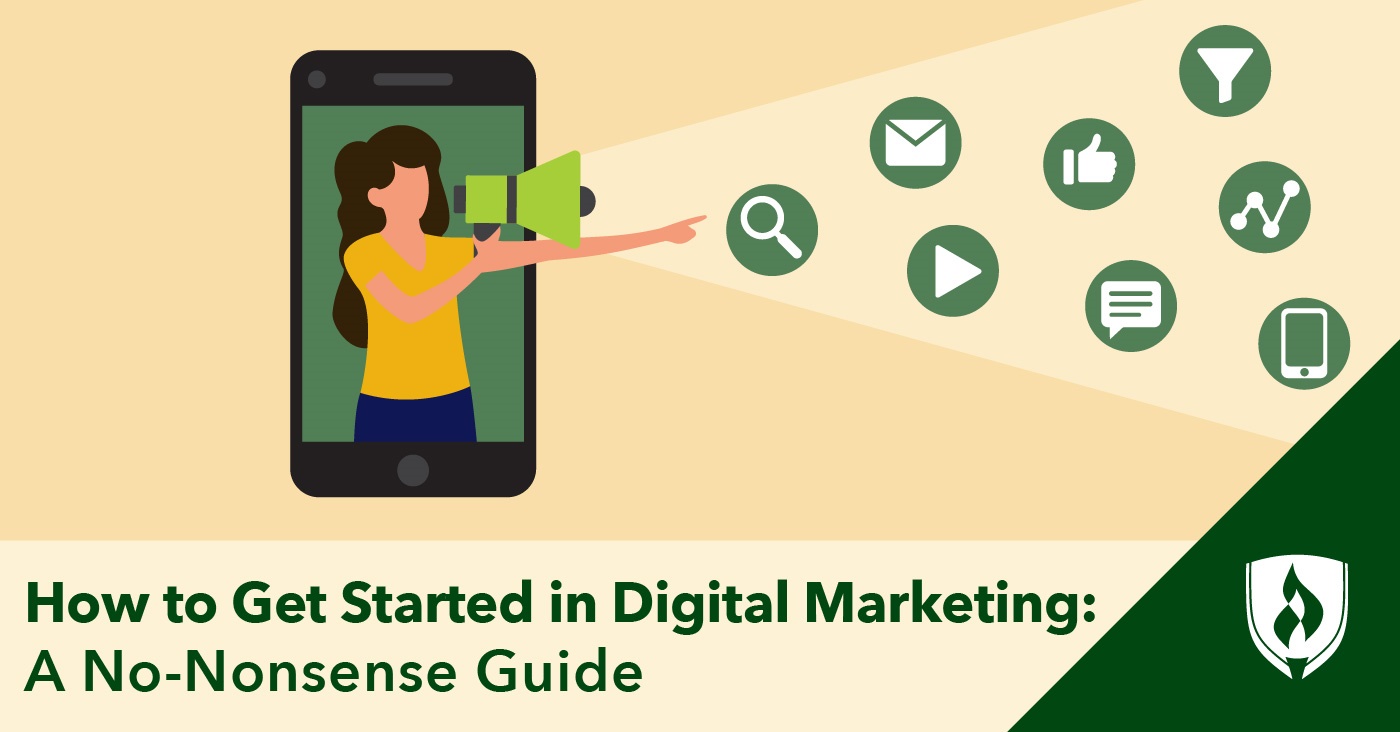
It’s no secret we live in an age of increasing digital engagement. People are looking to social media and online platforms for information, entertainment and to tend to their everyday needs. With this move to online-focused activities, the marketing field has had to adapt. The age of traditional advertising tactics is fading, as easily trackable digital marketing methods are on the rise. This upheaval in marketing comes with the need for professionals who understand the ins and outs of the various digital marketing niche specialties and how they work best together.
Could that digital marketing professional be you? Whether you already have a broad understanding of the digital marketing world or are just discovering an interest in this area, this article will guide you through the need-to-knows for getting started in digital marketing.
What is digital marketing?
Digital marketing is the use of digital channels like email, websites, search engines and more to promote products and services. This sounds simple in a one-sentence summary, but there’s a lot more to it.
Rather than being a one-track-focused field, digital marketers have the ability to apply themselves in a variety of specialized areas. The field blends advertising and promotion tasks with content creation, technology and audience interaction—and that’s just to name a few! Because of this, you can find digital marketing professionals with vastly different skill sets. Some have a knack for communication, while others have a strong grasp of budgeting and analytical thinking.
Common digital marketing roles
There are quite a few niche focus areas in digital marketing, with roles ranging from individual contributor specialists to director-level (and beyond). This includes, but is not limited to:
- Paid media
- Content marketing
- Social media marketing
- Search engine optimization (SEO)
- Email marketing
- Video marketing
While there are certainly branches of individual expertise in digital marketing, the work is typically highly collaborative. They rarely work alone and are often working directly with creative teams, external vendors and key client stakeholders to execute their work.
For example, a digital marketing specialist could be tasked with setting a strategy to meet a goal set by a client or internal leadership. Once they have the strategy set, they’ll need to partner with creative professionals to guide and review or approve their work, dealing with both visual and written content. Depending on the role, they may then need to work with external vendors to deploy and monitor the assets created for this new initiative. Once the campaign or initiative is completed, they’ll report back on performance and provide recommendations to stakeholders.
Education and skills: What do you need to get started in digital marketing?
So, what does it take to get established in this field? For one, a formal education will likely be a big piece of the puzzle. According to the Bureau of Labor Statistics (BLS), a bachelor’s degree is typically required for advertising, promotions or marketing management roles—usually in marketing, business, journalism or another communications-focused field.1
Additionally, aspiring digital marketers may benefit from supplemental courses and professional certifications targeting specific digital marketing skills. At a minimum, they can help demonstrate that you’re invested and interested in a certain area of digital marketing.
Education and certifications are just some factors potential employers are weighing—you can also bolster your case outside of the classroom.
Eva Chung, web marketing lead at Advantis Global®, sums up the most important asset for a digital marketing applicant in just one word: “Experience.”
She advises would-be digital marketers to seek out opportunities to grow other businesses—while these are not always the most lucrative roles, taking on projects for small local businesses and organizations can be a viable option for those new to the field. Additionally, internships and volunteer work can help you get a foothold early in your career.
Another experience-building option is to focus on creating your own personal brand and digital presence.
“Find something you’re passionate about on social media and start marketing yourself,” Chung says. “You will have the flexibility to try many new strategies, programs and content creation [ideas].”
Ultimately, the goal of this accumulation of experience and education is to develop a well-rounded set of digital marketing skills—so don’t be afraid to get a little creative in how you go about building them.
Common digital marketing skills
Given the variety of roles falling under the umbrella of digital marketing, you won’t be surprised to find that there’s quite a variety of specialized technical marketing skills you can focus on developing. Here are just a few commonly sought-after options:
- Copywriting
- Pay-per-click (PPC) advertising
- Search engine optimization (SEO)
- Social media marketing
- Marketing automation and technology
- Project management
- Data analysis
- Conversion rate optimization
- Audience building
- Community management
Looking beyond technical skills, digital marketers will also need a strong mix of transferable “soft skills” to be effective. Whether you’re crafting public-facing messages or preparing internal reports on a new campaign’s effectiveness, you’ll need to be a successful and clear communicator who understands the needs of your audience.
Time management, organization and attention to detail are all interconnected and critical for this line of work as well—you’ll likely have multiple projects to manage on varying timelines, and it’s on you to keep it all on track.
Which digital marketing specialization should you pursue?
Knowing that there’s a broad array of specialized digital marketing roles to potentially start out in does lead to one conundrum—figuring out where you’d best fit. While there’s no universal way to easily figure this out, you can lean on the advice of digital marketing professionals who’ve navigated this decision.
Picking a niche requires a level of self-awareness regarding your own abilities and an understanding of the needs each area has. Take a moment and consider what you could bring to the digital marketing world. What do you have that they are looking for?
Stephan Heffernan, digital marketing specialist for The Connected Narrative, encourages that, “If you're not sure where to start, think about what interests you and what skills you have. Are you good with numbers and analytics? Or do you enjoy making engaging and creative video content? Let your skills and experience narrow down your focus, and then you can start to explore specific niches within digital marketing.”
Keep in mind that while there’s specialization within digital marketing, many roles are based on the same foundation—the niche just reflects a deeper understanding of a specific tactic or approach. Employers don’t always have the budget to support a large team of specialists for every tactical approach, so there’s a good chance you’ll end up wearing multiple hats over the course of your career.
Joe Karasin, head of growth marketing at CircleIt®, says, “I found my niche early [in] paid search, but I quickly learned that digital marketing positions at most companies are not as specialized as one might think. You may be very skilled at one facet of the industry, but you will end up doing work in other niches.”
Digital marketing resources
One clear benefit of this career field? There’s a huge number of digital marketers looking to showcase their expertise by providing helpful resources for both upstart digital marketers and established professionals.
If you are looking to learn more about digital marketing, there are a few places you can start:
Of course, this is just a starting point for your dive into digital marketing. There’s a ton of marketing terms, abbreviations and concepts to master, but the more you can absorb now, the easier the transition to life as a digital marketing professional will be.
Get your start
There’s a lot to take in when considering a career in digital marketing. The variety of tactics and skills used in this field make it an exciting—and at times challenging—option for launching a career. While the strategies and channels used by digital marketers can and will change over time, a Marketing degree can provide a consistent foundation to branch out from.
If you’re considering earning a marketing degree, you’ll want to check out our article “Is a Marketing Degree Worth It? 5 Factors to Consider.”
1Bureau of Labor Statistics, U.S. Department of Labor, Occupational Outlook Handbook, [accessed July 2022] www.bls.gov/ooh/. Information represents national, averaged data for the occupations listed and includes workers at all levels of education and experience. This data does not represent starting salaries. Employment conditions in your area may vary.
Advantis Global is a registered trademark of Advantis Global, Inc.
CircleIt is a registered trademark of Hanan S. Mohammed.




